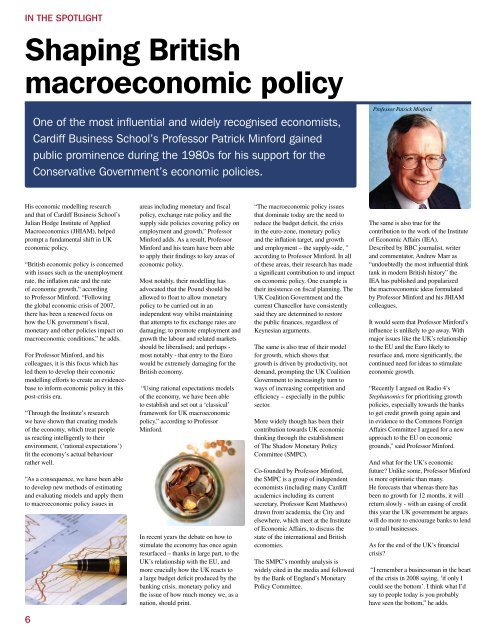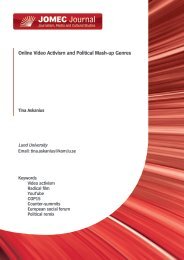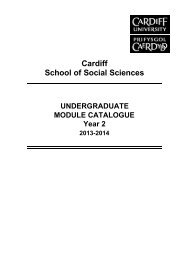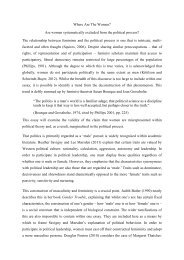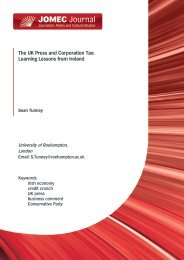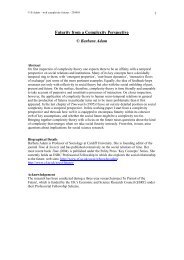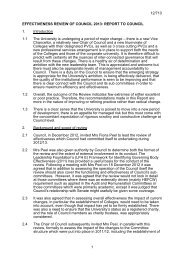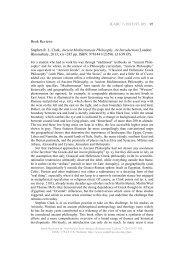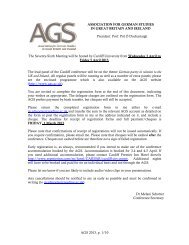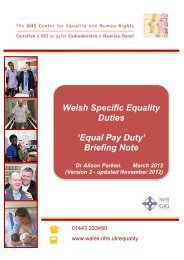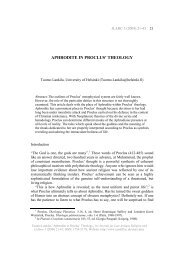January's issue of Cardiff University News
January's issue of Cardiff University News
January's issue of Cardiff University News
Create successful ePaper yourself
Turn your PDF publications into a flip-book with our unique Google optimized e-Paper software.
IN THE SPOTLIGHT<br />
Shaping British<br />
macroeconomic policy<br />
One <strong>of</strong> the most influential and widely recognised economists,<br />
<strong>Cardiff</strong> Business School’s Pr<strong>of</strong>essor Patrick Minford gained<br />
public prominence during the 1980s for his support for the<br />
Conservative Government’s economic policies.<br />
Pr<strong>of</strong>essor Patrick Minford<br />
His economic modelling research<br />
and that <strong>of</strong> <strong>Cardiff</strong> Business School’s<br />
Julian Hodge Institute <strong>of</strong> Applied<br />
Macroeconomics (JHIAM), helped<br />
prompt a fundamental shift in UK<br />
economic policy.<br />
“British economic policy is concerned<br />
with <strong>issue</strong>s such as the unemployment<br />
rate, the inflation rate and the rate<br />
<strong>of</strong> economic growth,“ according<br />
to Pr<strong>of</strong>essor Minford. “Following<br />
the global economic crisis <strong>of</strong> 2007,<br />
there has been a renewed focus on<br />
how the UK government’s fiscal,<br />
monetary and other policies impact on<br />
macroeconomic conditions,” he adds.<br />
For Pr<strong>of</strong>essor Minford, and his<br />
colleagues, it is this focus which has<br />
led them to develop their economic<br />
modelling efforts to create an evidencebase<br />
to inform economic policy in this<br />
post-crisis era.<br />
“Through the Institute’s research<br />
we have shown that creating models<br />
<strong>of</strong> the economy, which treat people<br />
as reacting intelligently to their<br />
environment, (‘rational expectations’)<br />
fit the economy’s actual behaviour<br />
rather well.<br />
“As a consequence, we have been able<br />
to develop new methods <strong>of</strong> estimating<br />
and evaluating models and apply them<br />
to macroeconomic policy <strong>issue</strong>s in<br />
areas including monetary and fiscal<br />
policy, exchange rate policy and the<br />
supply side policies covering policy on<br />
employment and growth,” Pr<strong>of</strong>essor<br />
Minford adds. As a result, Pr<strong>of</strong>essor<br />
Minford and his team have been able<br />
to apply their findings to key areas <strong>of</strong><br />
economic policy.<br />
Most notably, their modelling has<br />
advocated that the Pound should be<br />
allowed to float to allow monetary<br />
policy to be carried out in an<br />
independent way whilst maintaining<br />
that attempts to fix exchange rates are<br />
damaging; to promote employment and<br />
growth the labour and related markets<br />
should be liberalised; and perhaps -<br />
most notably - that entry to the Euro<br />
would be extremely damaging for the<br />
British economy.<br />
“Using rational expectations models<br />
<strong>of</strong> the economy, we have been able<br />
to establish and set out a ‘classical’<br />
framework for UK macroeconomic<br />
policy,” according to Pr<strong>of</strong>essor<br />
Minford.<br />
In recent years the debate on how to<br />
stimulate the economy has once again<br />
resurfaced – thanks in large part, to the<br />
UK’s relationship with the EU, and<br />
more crucially how the UK reacts to<br />
a large budget deficit produced by the<br />
banking crisis, monetary policy and<br />
the <strong>issue</strong> <strong>of</strong> how much money we, as a<br />
nation, should print.<br />
“The macroeconomic policy <strong>issue</strong>s<br />
that dominate today are the need to<br />
reduce the budget deficit, the crisis<br />
in the euro-zone, monetary policy<br />
and the inflation target, and growth<br />
and employment – the supply-side, ”<br />
according to Pr<strong>of</strong>essor Minford. In all<br />
<strong>of</strong> these areas, their research has made<br />
a significant contribution to and impact<br />
on economic policy. One example is<br />
their insistence on fiscal planning. The<br />
UK Coalition Government and the<br />
current Chancellor have consistently<br />
said they are determined to restore<br />
the public finances, regardless <strong>of</strong><br />
Keynesian arguments.<br />
The same is also true <strong>of</strong> their model<br />
for growth, which shows that<br />
growth is driven by productivity, not<br />
demand, prompting the UK Coalition<br />
Government to increasingly turn to<br />
ways <strong>of</strong> increasing competition and<br />
efficiency – especially in the public<br />
sector.<br />
More widely though has been their<br />
contribution towards UK economic<br />
thinking through the establishment<br />
<strong>of</strong> The Shadow Monetary Policy<br />
Committee (SMPC).<br />
Co-founded by Pr<strong>of</strong>essor Minford,<br />
the SMPC is a group <strong>of</strong> independent<br />
economists (including many <strong>Cardiff</strong><br />
academics including its current<br />
secretary, Pr<strong>of</strong>essor Kent Matthews)<br />
drawn from academia, the City and<br />
elsewhere, which meet at the Institute<br />
<strong>of</strong> Economic Affairs, to discuss the<br />
state <strong>of</strong> the international and British<br />
economies.<br />
The SMPC’s monthly analysis is<br />
widely cited in the media and followed<br />
by the Bank <strong>of</strong> England’s Monetary<br />
Policy Committee.<br />
The same is also true for the<br />
contribution to the work <strong>of</strong> the Institute<br />
<strong>of</strong> Economic Affairs (IEA).<br />
Described by BBC journalist, writer<br />
and commentator, Andrew Marr as<br />
“undoubtedly the most influential think<br />
tank in modern British history” the<br />
IEA has published and popularized<br />
the macroeconomic ideas formulated<br />
by Pr<strong>of</strong>essor Minford and his JHIAM<br />
colleagues.<br />
It would seem that Pr<strong>of</strong>essor Minford’s<br />
influence is unlikely to go away. With<br />
major <strong>issue</strong>s like the UK’s relationship<br />
to the EU and the Euro likely to<br />
resurface and, more significantly, the<br />
continued need for ideas to stimulate<br />
economic growth.<br />
“Recently I argued on Radio 4’s<br />
Stephanomics for prioritising growth<br />
policies, especially towards the banks<br />
to get credit growth going again and<br />
in evidence to the Commons Foreign<br />
Affairs Committee I argued for a new<br />
approach to the EU on economic<br />
grounds,” said Pr<strong>of</strong>essor Minford.<br />
And what for the UK’s economic<br />
future? Unlike some, Pr<strong>of</strong>essor Minford<br />
is more optimistic than many.<br />
He forecasts that whereas there has<br />
been no growth for 12 months, it will<br />
return slowly - with an easing <strong>of</strong> credit<br />
this year the UK government he argues<br />
will do more to encourage banks to lend<br />
to small businesses.<br />
As for the end <strong>of</strong> the UK’s financial<br />
crisis?<br />
“I remember a businessman in the heart<br />
<strong>of</strong> the crisis in 2008 saying, ‘if only I<br />
could see the bottom’. I think what I’d<br />
say to people today is you probably<br />
have seen the bottom,” he adds.<br />
6


